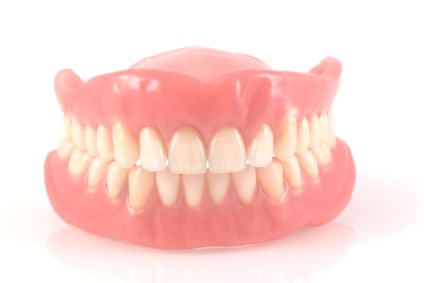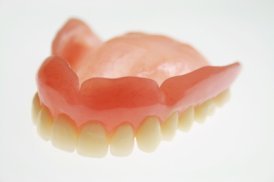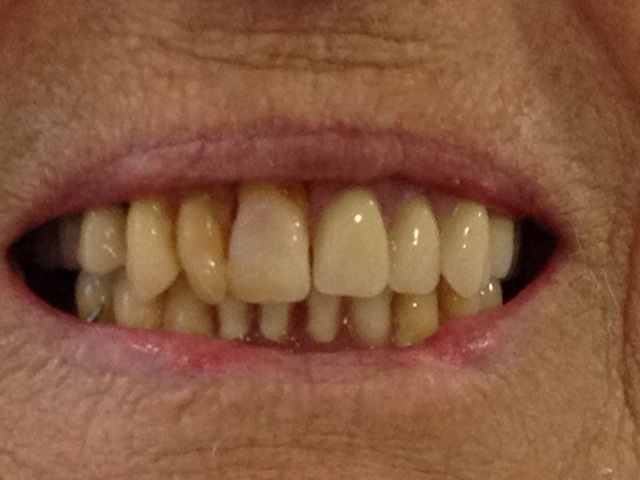Dentures A New Smile
New dentures a new smile in days?
You can get new dentures made up really quickly, if you need a new smile for an important occasion. But there are a few things you should know about dentures before you choose the "express route".
 full dentures
full denturesAnd knowing about correct denture CARE will make sure that your investment lasts as long as possible!
New dentures will always cost money, and looking after your dentures properly will always pay off in the long run. There are 2 important reasons for this;
- If your dentures are perfectly clean, they will not harbor bacteria, viruses nor fungus spores. This is obviously much better for your gums and your mouth in general!
- By cleaning your dentures correctly, you will minimize the chances of causing microscopic surface abrasion, making the denture surfaces dull and more likely to attract staining and tartar build-up.
First off, I think an Ultrasonic Denture Cleaner is ESSENTIAL to keeping your dentures hygienically clean.
An ultrasonic denture cleaner is basically a small container, slightly bigger than a large mug, just big enough to hold a set of full dentures. You have to put a liquid in there, which may be plain water, or - better - a dedicated antibacterial cleaning solution for dentures. This special cleaning solution will kill bacteria, viruses and fungus spores.
So far, this sounds just like a plain old denture bath.But the MAGIC starts when you turn on the ultrasonics! The bath will make a quiet buzzing noise, and you may see tiny bubbles boiling off the surfaces of your dentures. The ultrasonics are dislodging all the visible AND microscopic debris from your dentures - BUT without any abrasive scrubbing, so your dentures stay shiny and glossy!
You can read all about ultrasonic denture cleaners at my page Ultrasonic Denture Cleaners.
Good dentures can sometimes be surprisingly difficult for a dentist to make. A lot depends on the attitude and expectations of the denture wearer. If you are expecting a new set of denture teeth to be just like your natural teeth, I'm afraid you are probably going to be disappointed.
After all, if you have FULL upper and lower dentures, research shows that you can only chew with about 30% of the force that you could with your own natural, real teeth.
That's only a third of your normal biting power.
If you had lost the lower part of one of your legs, you wouldn't expect to be able to play basketball as well as you could before, even with the best artificial leg in the world.
The same thing applies to dentures. You only have about ONE THIRD of the bite force that you had with natural teeth. I'm afraid we haven't reached the "Six Million Dollar Man" stage of technology yet! So you need to have REALISTIC expectations.
If you're looking for cheap dentures or low cost dentures, go to my new page HERE to discover your 3 best options!.
 A full upper denture
A full upper dentureDentures A New Smile?
There are two things my professors used to say to dental students that stick in my mind from dental school;"
- Dentures are NOT an alternative for NATURAL teeth. They are an alternative to NOT HAVING ANY TEETH at all."
- And, this one is a tad flippant; "You wouldn't expect to be able to SEE with a glass eye. You can't expect to be able to chew steak with dentures!"
While these phrases sound cute, there IS an underlying truth behind them. Dentures can never be as good as real, natural teeth. But, as an alternative to "no teeth at all", they can be pretty darn good!
You just have to set your sights on a realistic target. You will have to adjust your diet a little. You may need to use a denture adhesive to help keep your dentures from slipping or moving when you eat. The best denture adhesive is a matter of personal preference. You can read about my recommendations on that page.
But first, what kinds of dentures are there?
There are several types of dentures, depending on how many teeth you are missing!
Dentures A New Smile?
 Can you spot which teeth are on the partial denture?
Can you spot which teeth are on the partial denture?You can read more about the possibilities at my Different Types of dentures page.
You can also take a look at some before-and-after pictures at Dentures before and after photos.
IT'S IMPORTANT TO DECIDE WHAT TYPE OF DENTURES YOU HAVE - FULL dentures, or PART dentures.
PART denture wearers are frequently interested in the advantages of Chrome Cobalt upper dentures.
On the other hand, for FULL denture wearers, if you are looking for the best dentures possible, you will probably need to think about some dental implants to support your denture. Implant-supported dentures are rock-solid. But there are several other advantages, too! Find out what they are at the Denture Implants page!
There is also a new page on this website about Dentures vs Implants. Read about the pros and cons of dentures and implants, and HOW it's possible to combine the two for the best solution; go to my page HERE.
NOW, Let's get back to those One Day Dentures!
One thing a lot of patients ask me about is how quickly a new set of dentures can be made. They have seen some adverts for One Day Dentures or 'new dentures a new smile'. When I first heard about this, I couldn't imagine how it would be possible for a dentist to make a set of dentures from scratch in a single day.
Then I found out that the phrase 'one day dentures' can have two meanings! The first one means what it says; you get your dentures within 24 hours of walking in to the dentists' office. More about this option in a minute!
The second meaning is where you still have some natural teeth left, but you want them taking out and full dentures putting in.
The dentures are made in the usual way, but you only get your remaining teeth taken out when the new dentures are finished and ready to be fitted. So you never have to walk around with no teeth at all.
This type of 'denture in a day' is usually called an 'immediate denture' by dentists, because it is put in immediately after the last teeth are removed. Another advantage is that the dentures protect the gums where you had the teeth out, preventing bits of food getting in. The gums tend to heal up more quickly.
However, one disadvantage with immediate dentures is that the gums will shrink pretty quickly in the first month or so, as they heal up. This means the denture won't fit so snugly after about 3 months, and you will need to get your dentures relined. This completely normal, but you need to be aware of this process beforehand. It means an extra visit to your dentist's office a few months down the line, and possibly an additional charge.
BUT, it IS possible for you to do this relining yourself at home, with denture reline kits. This can be a great option if your new immediate denture starts getting loose after only a few weeks due to the gum shrinking where you had some teeth removed. These at-home kits work pretty well. BUT after 3 to 6 months, though, you will really need to have the denture relined professionally by a dentist, to get a long-lasting good fit. Also, a laboratory-processed denture reline is much more durable than a do-it-yourself kit. The acrylic is denser, ie. less porous, and so less likely to harbor harmful bacteria.
BUT AS A QUICK solution for a few months, these denture reline kits can be great!
One denture that is quite a bit different from full dentures is the Dental Flipper. This is for replacing just 1 or 2 teeth, and is quite small. We usually regard it as being a temporary or interim solution for a missing tooth, especially while an implant is healing up. BUT sometimes it can be satisfactory for some years.
You can read more about dentures for short-term use at my page on Temporary Dentures.
Dentures A New Smile?
Here are some Pictures of Dentures showing the different types of denture, including full dentures, partial dentures and implant-supported dentures.
An important consideration for any type of denture will be Denture Prices. The cost of dentures can vary A LOT. At one extreme, there are dental groups such as Affordable Dentures in the U.S.A. who can make inexpensive dentures that are great value for money.
Also look at my page on cheap dentures to read about your 3 best options!
One other option may be to do a little of the work yourself at home. This isn't as crazy as it might sound - take a look at Make your own Dentures for more information.
At the other extreme, I know of a dentist who charges $10,000 for a full set of false teeth!
How come there is such a huge range of prices?
I tell people it's a bit like buying a car. If you think about a Ford, a Cadillac and a Mercedes, all of them have 4 wheels, 4 seats, and an engine. And all of them will get you from A to B.
The difference is HOW they get you from A to B.
- How comfortably.
- How efficiently.
- How reliably.
- And of course how long they last.
Dentures A New Smile?
If we think about full dentures in that way, the big range in price becomes more understandable.
The inexpensive dentures will fit reasonably well at first, work well enough, and look OK, but they will be more liable to crack or break, and they will wear down more quickly. However, they will do their job well enough to start with!
More expensive dentures should have a better fit, should look natural, work well when you're chewing, be resistant to cracking or breaking, and of course last longer.
Does "lasting longer" really matter?
Bearing in mind that your gums are continually changing shape, gradually shrinking, you might wonder "how long do dentures need to last before I should get a new set?" That's a good point.
For most folks, you should consider getting new dentures every 5 to 7 years. Of course, it depends on how your gums change, and if the dentures are still fitting and working OK. I have seen many dentures still fitting well, looking good and showing minimal signs of wear at 10 or 12 years. So there's no hard-and-fast rule here.
Whatever type of denture you have, it may not stay in place just quite as well as you'd like. Even with the best quality dentures, sometimes the shape of your gums will not give the denture enough grip. It moves around when you try to chew certain foods.
This is where a very thin application of a good quality denture adhesive will make a big difference. These gels and pastes are NOT just for badly-fitting and old dentures. They actually work even better with newer, well-fitting teeth!
The best denture adhesive is a matter of personal preference. You may need to try a few different ones to make up your own mind. Also, there is a NEW denture adhesive on the market, which I think is probably going to turn out to be "the Best"; GO TO MY NEW PAGE AT Best Denture Products by Dallas dentist Dr. Lorin Berland.
Dr. Berland has produced a line of denture products that are very high quality but at VERY competitive prices.
One denture adhesive problem that hit the headlines a while ago was a link between some adhesives and zinc poisoning. This turned out to affect only a few people who were using about 2 or 3 tubes of adhesive A WEEK, instead of the recommended amount where a single tube would last about 8 weeks!
Essentially, their dentures fitted so badly that they had to use great wads of the gel to fill in the huge gaps under the dentures. The correct solution would have been to get a new set of teeth made up.
Dentures A New Smile?
What about denture care?
Keeping your dentures clean is very important. You must prevent a build-up of bacteria on the denture surface. Here is my guide to cleaning dentures. One mistake a lot of denture wearers make using a normal tooth brush and normal toothpaste.
This is WRONG.
A normal toothpaste is much too abrasive for dentures. Toothpastes are designed to clean and polish tooth enamel, which is extremely hard. The acrylic used in dentures, even the most expensive, is nowhere near as hard as tooth enamel.
Using a normal toothpaste on your dentures will gradually dull the denture surface, leaving microscopic scratches all over the acrylic. This actually makes it easier for bacteria to collect on the denture.
An essential tool for cleaning dentures is an ultrasonic denture cleaner.
These clean the whole denture, inside and out, using ultrasonics in a small bath. Ultrasonic denture cleaners are great at shifting any tiny deposits in the nooks and crannies of a denture.
BUT the denture has to be reasonably clean before it goes in the bath. You still need to give it a good brushing to remove any food debris and plaque. Then the ultrasonic cleaner will do the rest.
To find out more about cleaning your dentures, GO TO MY NEW PAGE AT Best Denture Products by Dallas dentist Dr. Lorin Berland.
One thing I am asked about a lot is how to make denture teeth look whiter. You can read my guide at the How to Whiten Dentures page.
Dentures can sometimes cause problems, the main one being discomfort or irritation of one sort or another. You can read more about this at Denture Pain.
Dentures may not be a perfect answer to replacing lost teeth, but they can serve very well. One big advantage is that you can pretty much choose how you want your teeth to look!
You can have them perfectly straight and level, and as white as you like!
Or, you may choose to have them like your own teeth were, with a small gap here and there. It's up to you! New dentures a new smile!
Back to Top


